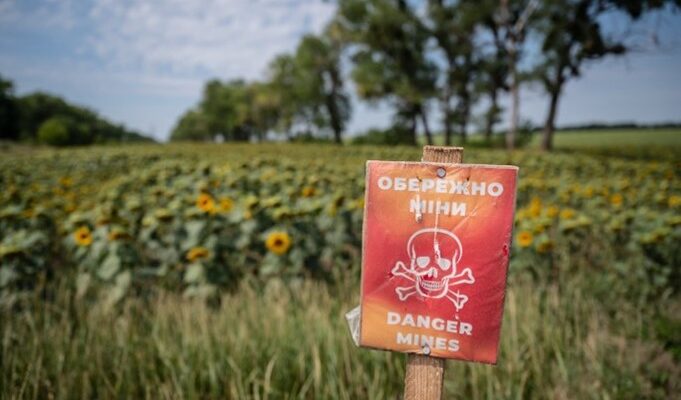Clearing agricultural land of mines and other remnants of war
Ukraine | 2023 | CBPF
Ukraine, Kharkivka, Mykolaivska, and Khersonska oblasts. The war has devastated Ukraine’s agriculture and food production, disrupted supply chains, and increased production costs for small farmers.
According to the Rapid Damage and Needs Assessment published in February 2023, Ukraine’s production of grain and oilseed decreased by 37 per cent in 2022. Almost 90 per cent of small-scale crop producers surveyed by FAO reported a fall in revenue because of the war, and one in four reported having stopped or significantly reduced their agricultural activity.
For farmers who can access their land, making sure the land is safe is critical. “Many families and small-scale farmers in front-line regions are not planting this season because they know their fields are dangerous or they are risking their lives to plant on mined land or contaminated soil,” noted Pierre Vauthier, Head of FAO Ukraine .
With funding from the Ukraine Humanitarian Fund, the Food and Agriculture Organization (FAO) and the World Food Programme (WFP) launched a joint program in collaboration with mine action partner Fondation Suisse de Déminage (FSD) to support smallholder farmers and rural families most affected by the war.
FAO, WFP, and FSD, working closely with local communities and authorities, and Ukraine’s Ministry of Agrarian Policy and Food, have a multi-step plan. First, they will use satellite imagery to find and map areas in need of de-mining.
Then, de-mining teams will clear these areas of mines and other dangerous war remnants, focusing on those that can be quickly made safe. In the third step, FAO and FSD will test the soil for pollution from exploded weapons.
At the same time, FAO and WFP will talk to small farmers and rural families to understand what they need to restart farming. They will provide direct support, either in goods or cash, wherever possible.
“Making the land safe and free of explosive remnants of the war is the first step to rebuilding resilient and prosperous rural communities in Ukraine, who have been on the front lines of this war, and preventing their long-term dependence on humanitarian assistance,” said Denise Brown, the UN Humanitarian Coordinator in Ukraine.
The project has been supported by the Ukraine Humanitarian Fund, as well as other donors. With full support, FAO and WFP estimate $60 million in direct community food assistance could be saved.
Original story: adapted from original article by FAO
More information about the Ukraine Humanitarian Fund
